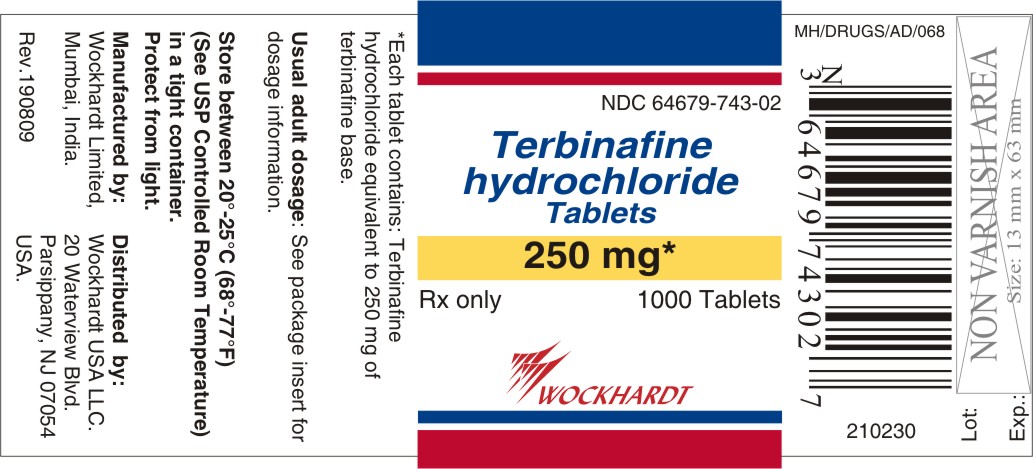
Terbinafine Hydrochloride Tablet while Breastfeeding
What is Terbinafine Hydrochloride Tablet used for?
Terbinafine Hydrochloride Tablet while breastfeeding safe or not? Can there be any side effects for infant while using it during breastfeeding?

Nursing Mothers After oral administration, terbinafine is present in breast milk of nursing mothers. The ratio of terbinafine in milk to plasma is 7:1. Treatment with terbinafine hydrochloride tablets is not recommended in nursing mothers.
Terbinafine Hydrochloride Tablet Breastfeeding Analsys
Terbinafine while Breastfeeding
SafeCAS Number: 91161-71-6
Pharmacokinetics data (low oral bioavailability, high volume of distribution and high protein-binding capacity) explains the scanty excretion into breast milk observed in nursing mothers who received this medication. In addition, a poor oral absorption would make even more difficult any pass of this drug through ingested milk to the infant's blood, except in newborns or premature who would show a higher intestinal absorption. Avoid using in prematures who are under treatment with caffeine or theophylline because terbinafine alters its metabolic degradation and increases plasma concentration. Since topical absorption is less than 1%, a significant excretion into breast milk after application on skin is not expected. Do not use on the breast to prevent ingestion by the infant, otherwise apply after a meal and wipe it out thoroughly with water before next feeding. It is recommended to avoid using on the nipple creams, gels and other products intended for use on skin that may contain paraffin (mineral oil) in order to keep from absorption the infant.
Terbinafine Hydrochloride Tablet Breastfeeding Analsys - 2
Terbinafine while Breastfeeding
CAS Number: 91161-71-6
Limited information indicates that oral maternal doses of 500 mg daily produce low levels in milk and would not be expected to cause any adverse effects in breastfed infants, especially if the infant is older than 2 months. Monitor the infant for jaundice or other signs of liver toxicity, especially in younger, exclusively breastfed infants. Some sources recommend avoiding oral terbinafine during nursing.[1] Topical terbinafine has not been studied during breastfeeding. Because only about 1% is absorbed after topical application, it is considered a low risk to the nursing infant.[1][2] Avoid application to the nipple area and ensure that the infant's skin does not come into direct contact with the areas of skin that have been treated. Only water-miscible cream, gel or liquid products should be applied to the breast because ointments may expose the infant to high levels of mineral paraffins via licking.[3]
What should I do if I am breastfeeding mother and I am already exposed to Terbinafine Hydrochloride Tablet?
Terbinafine Hydrochloride Tablet is safe in breastfeeding and should not create any health problem for your baby but in case you feel any health issue associated with Terbinafine Hydrochloride Tablet you should contact your doctor or health care provider. Be it pregnancy or lactation you shall keep your doctor informed.
I am nursing mother and my doctor has suggested me to use Terbinafine Hydrochloride Tablet, is it safe?
Usage of Terbinafine Hydrochloride Tablet is safe for nursing mothers and baby, No worries.
If I am using Terbinafine Hydrochloride Tablet, will my baby need extra monitoring?
No
Who can I talk to if I have questions about usage of Terbinafine Hydrochloride Tablet in breastfeeding?
US
National Womens Health and Breastfeeding Helpline: 800-994-9662 (TDD 888-220-5446) 9 a.m. and 6 p.m. ET, Monday through Friday
UK
National Breastfeeding Helpline: 0300-100-0212 9.30am to 9.30pm, daily
Association of Breastfeeding Mothers: 0300-330-5453
La Leche League: 0345-120-2918
The Breastfeeding Network supporter line in Bengali and Sylheti: 0300-456-2421
National Childbirth Trust (NCT): 0300-330-0700
Australia
National Breastfeeding Helpline: 1800-686-268 24 hours a day, 7 days a week
Canada
Telehealth Ontario for breastfeeding: 1-866-797-0000 24 hours a day, 7 days a week
